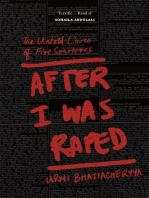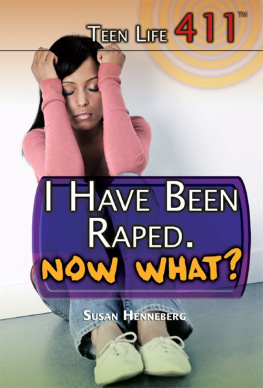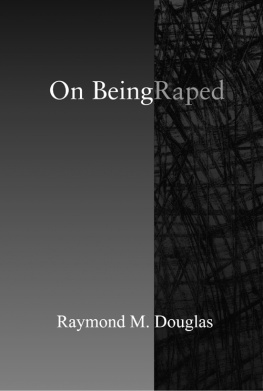IM THE GIRL WHO WAS RAPED
Copyright 2016, 2017 Michelle Hattingh
Except for the use of short passages for review purposes, no part of this book may be reproduced, in part or in whole, or transmitted in any form or by any means, electronically or mechanically, including photocopying, recording, or any information or storage retrieval system, without prior permission in writing from the publisher or a licence from the Canadian Copyright Collective Agency (Access Copyright).
Published in Canada by Inanna Publications, Toronto, 2017
in conjunction with Spinifex Press, Victoria, Autralia, 2017
First published by Modjaji Books, Cape Town, South, Africa, 2016

We gratefully acknowledge the support of the Canada Council for the Arts and the Ontario Arts Council for our publishing program. We also acknowledge the financial support of the Government of Canada.
Printed and Bound in Canada.
Cover design: Val Fullard
eBook: tikaebooks.com
Thank you to Susan Hawthorne for permission to include her poem How do you protect yourself from rape? first published on project365plus.blogspot.com.au 2016.
Library and Archives Canada Cataloguing in Publication
Hattingh, Michelle, 1988-, author
Im the girl who was raped / a memoir by Michelle Hattingh.
Previously published: Cape Town, South Africa: Modjaji Books, 2016.
Issued in print and electronic formats.
ISBN 978-1-77133-445-7 (softcover).-- ISBN 978-1-77133-446-4 (epub).--
ISBN 978-1-77133-447-1 (Kindle).-- ISBN 978-1-77133-448-8 (pdf)
1. Hattingh, Michelle, 1988-. 2. Rape victims--South Africa--Biography. 3. Rape--South Africa. 4. Victims of crimes--South Africa--Biography. 5. Sex crimes--South Africa.I. Title.
HV6569.S7H38 2017 362.883092 C2017-905381-7
C2017-905382-5
Inanna Publications and Education Inc.
210 Founders College, York University
4700 Keele Street, Toronto, Ontario M3J 1P3
Telephone: (416) 736-5356 Fax (416) 736-5765
Email:
IM THE GIRL WHO WAS RAPED
A MEMOIR
MICHELLE HATTINGH

FOREWORD
BETTY MCLELLAN
T HE BOOK YOU ARE ABOUT TO READ describes every womans nightmare and many womens actual experience. Rape. Its a sad fact that, even in this so-called enlightened twenty-first century, womens reality is that we could be raped at any time (from infancy to very old age) and in any circumstance. Here, South African woman Michelle Hattingh is heartbreakingly honest as she recounts her own experience of rape and its aftermath.
In every nation on earth, mens predatory sexual behaviour is so commonplace that rape is seen by many as normal and to be expected. It is for that reason that, when it happens, blame can so easily be placed on the victim. Why wasnt she more careful? Why did she make herself so vulnerable? That women are all too often heard expressing an inability to relax around men, that a woman must always be on guard in case a man (friend, husband, stranger) decides to violate her, is a sad indictment of the male of the human species.
For many decades, feminists have wondered out loud why so many men interpret the male privilege afforded to them by patriarchy as giving them entitlement to access womens bodies without consent, and why so few perpetrators see any need to consider the consequences their forced sexual intrusion will have on their victims.
Prompted by the findings of detailed research undertaken by feminists, women have spoken out with confidence against mens violent sexual behaviour. Naming it for what it is, Susan Griffin wrote in 1971 that:
rape is a form of mass terrorism, for the victims of rape are chosen indiscriminately, but the propagandists for male supremacy broadcast that it is women who cause rape by being unchaste or in the wrong place at the wrong time in essence, by behaving as if they were free. (35)
Susan Brownmiller wrote that rape is nothing more or less than a conscious process of intimidation by which all men keep all women in a state of fear(15). Michelle Anderson refers to rape as sexually invasive dehumanization (643), while Robert Jensen concurs with the feminist understanding that rape is the sexualisation of power and adds that rape is about the fusion of sex and domination, about the eroticization of control(80).
A serious disappointment for feminists who have worked diligently to break the silence on sex crimes has been that there appears to be no appreciable change in the attitude and behaviour of many men. It was hoped that, by bringing the previously hidden crime of rape out into the open, raising consciousness about the devastating effects on victims, and focusing on the need for equality between the sexes, men would come to understand that womens bodies were not theirs for the taking. Feminists believed, perhaps naively, that most men were capable of developing an understanding of the notion of womens autonomy and that a respect for womens rights would follow. Among the many examples proving that not to be the case is that of high profile former England footballer Adam Johnson who is currently serving a six-year sentence in a British prison for sex offences with a fifteen-year-old girl. At his trial, he apologised and claimed to feel ashamed but, after one year in prison, he was secretly filmed sharing his true thoughts and feelings with other prisoners.
It wasnt his fault. He did nothing wrong, he said. Along with crude comments and gestures about his victim, he is heard regurgitating every myth imaginable about rape and sexual assault. Referring to his six-year sentence in response to a fellow prisoners remark that he didnt actually rape the girl, Johnson says: No, I wish I fucking didfor six years. He shows no remorse, only anger and self-pity. The most startling thing about Johnsons rant, said Joan Smith in a report for The Guardian , is his belief that men are the real victims in rape cases, at risk of being falsely accused by women who are too drunk to remember a sexual encounter.
When a woman who has been raped has the courage to name it for what it is and report the offence to the police, the blaming of the victim begins. Myths are recited by the perpetrator, his supporters, his legal team, and others in the community who refuse to believe men are capable of such behaviour. It was just sex, they say. She asked for it. She obviously wanted it. She was too ugly/fat/old/etc. to be raped. She had been drinking and put herself in a vulnerable position. She encouraged him, led him on, and then changed her mind. The victim-blaming often extends to actual verbal abuse as Adam Johnsons young victim expressed in her Victim Impact statement:
I had to face so much abuse. I was made out to be a liar. The gossip on social media and hearing all the horrible names that people have been calling me has been devastating to me, my friends and family. (Morley)
For rape victims generally, the victim-blaming and verbal abuse is just the beginning of all the negative effects they experience. There are invariably emotional effects that can include feelings of shame, humiliation, self-blame, PTSD , depression, anxiety, fear and suicidal thoughts. Also, there are physical and behavioural effects, for example, a dependence on alcohol and/or drugs, sleep disturbance, nightmares, venereal disease, and unwanted pregnancy.
Many of these effects were mentioned by victims/survivors of rape and sexual abuse in a national survey conducted in 1992 by the Australian Institute of Criminology. The survey was carried out with a view to discovering the prevalence of the crime in Australia and its effect on respondents. The 2,852 responses contained harrowing stories of incest, marital rape, rape by ex-partners, date rape, rape by acquaintances, bosses, doctors, priests, and others in positions of trust, as well as stranger-rape.








